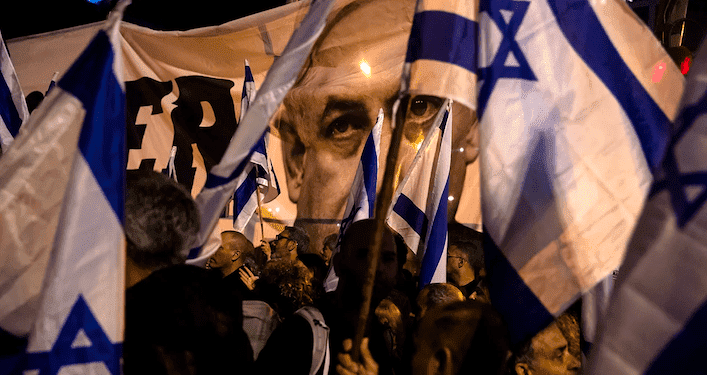Hundreds of thousands of people have marched in Israel in recent weeks over a controversial judicial overhaul spearheaded by Prime Minister Benjamin Netanyahu.
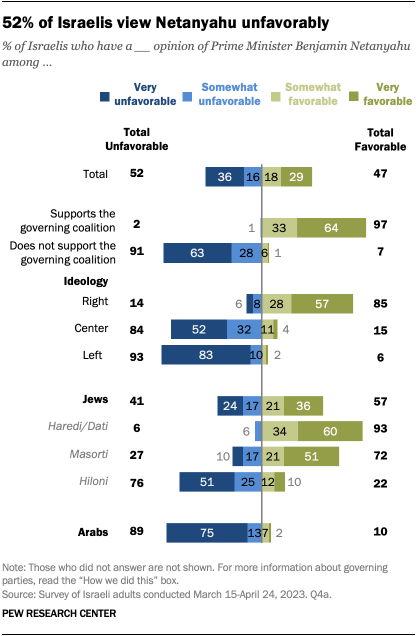
-
A Pew Research Center survey conducted in March and April found that Israelis were divided in their views of Netanyahu and perceived a lot of political conflict in their country. The survey was conducted during a previous wave of protests against judicial reform but prior to the July passage of a law limiting the power of Israel’s Supreme Court.
Views of Netanyahu
On balance, Israelis viewed Netanyahu slightly more unfavorably (52%) than favorably (47%) in the spring survey, but opinions varied widely.
People who supported Netanyahu’s conservative Likud party or other parties in his governing coalition had nearly unanimously positive views of Netanyahu: 97% said they had a favorable view of him, including 64% who had a very favorable view. But among those who did not support the governing coalition, only 7% had a favorable view of him, and 63% had a very unfavorable view.
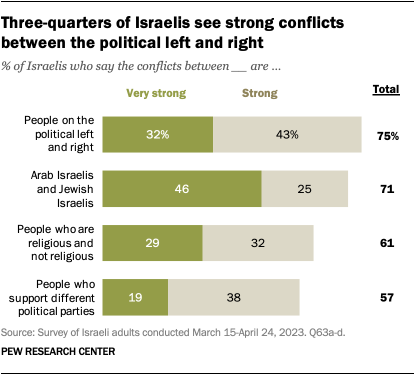
Ratings were divided along ideological lines, too: 85% of people on the political right saw Netanyahu favorably, compared with 15% of those in the center and 6% on the left.
Jewish and Arab Israelis also diverged in their views of Netanyahu: 57% of Jewish Israelis offered positive assessments, while only 10% of Arab Israelis did the same. Divisions were stark among Jews as well. While 93% of Haredi (“ultra-Orthodox”) and Dati (“religious”) Jews and 72% of Masorti (“traditional”) Jews had positive views of Netanyahu, only 22% of Hiloni (“secular”) Jews did.
Perceived conflicts in Israeli society
These divided views over Netanyahu reflect something most Israelis seem to agree on: that Israeli society is rife with divisions. Seven-in-ten or more Israelis saw strong conflicts between people on the political left and right, as well as between Arab and Jewish Israelis. The Arab-Jewish conflict stands out, however, because nearly half of Israelis saw it as a very strong conflict.
Majorities also said there are strong or very strong conflicts between those who support different political parties and between those who are and are not religious.
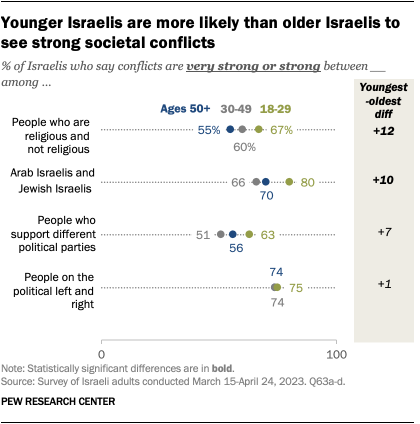
Younger Israelis tended to perceive most of these conflicts as more serious than older Israelis. For example, 67% of those under 30 saw strong conflicts between those who are religious and not religious, compared with 60% of those ages 30 to 49 and 55% of those 50 and older. The exception was for conflicts between the political left and right, where about three-quarters of people across age groups saw strong conflicts. But even here, younger people were more likely to see very strong conflicts.
Arab Israelis and Jewish Israelis largely agreed on where conflicts in society lie. They were equally likely to see political or ideological strife, and around seven-in-ten in each group also saw strong conflicts between Arab and Jewish Israelis. Jewish Israelis, however, were slightly more likely than Arab Israelis (48% vs. 39%) to see very strong conflicts between Arab and Jewish Israelis.
Among Jews, though, there were substantial differences in how likely people were to perceive conflicts between Arab and Jewish Israelis. Some 94% of Haredi/Dati Jews saw such conflicts, compared with 69% of Masorti Jews and 56% of Hiloni Jews.
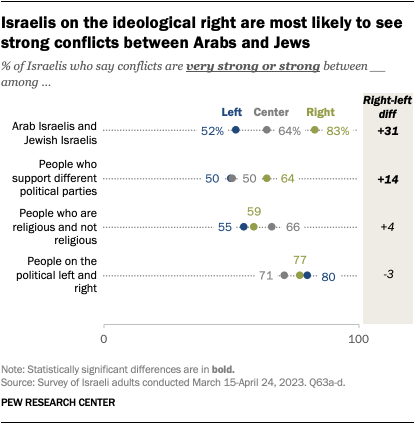
Israelis on the ideological left and right agreed that there are divisions between their two poles. But those on the right (64%) were somewhat more likely than those on the left (50%) or in the center (50%) to see conflicts between people who support different political parties. Those on the right were also significantly more likely to see conflicts between Arab and Jewish Israelis.

